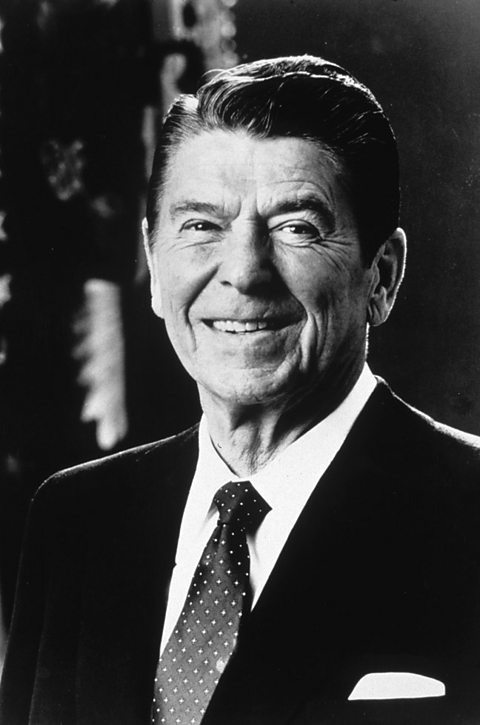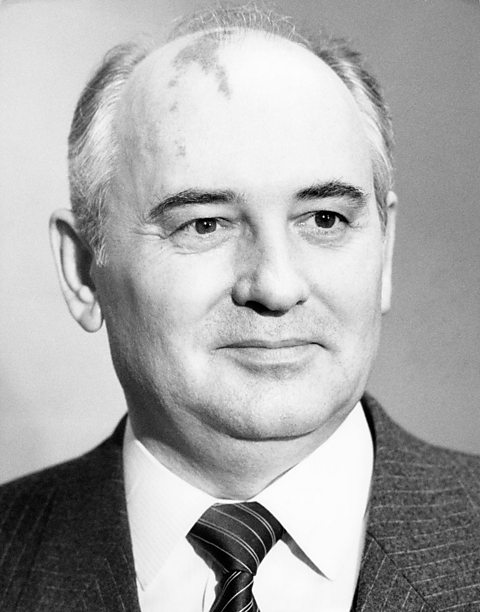The influence of Ronald Reagan and Mikhail Gorbachev

The last years of the Cold War were overseen by two very different leaders: Ronald Reagan, an ex-Hollywood actor, and Mikhail Gorbachev, a Ukrainian-Russian from a peasant farming background with a law degree from Moscow State University.
In 1980 Ronald Reagan was elected President of the United States. He was a committed anti-communist who referred to the Soviet Union as āthat evil empire'. He increased US defence spending by $32.6 billion and planned to spend it on:
- āStar Warsā, or the Strategic Defence Initiative, which was a plan to create a system using satellites and lasers to shoot down any missiles that might be launched by the USSRUnion of Soviet Socialist Republics - collection of states, also known as the Soviet Union. against the USA. This plan, had it been initiated, would have swung the nuclear balance strongly in the USAās favour.
- The US military developed a neutron bombA weapon that would kill people without damaging buildings.. The Soviet Union described the neutron bomb as āa capitalist weaponā because it was designed to destroy people while leaving their property intact. While the USSR did not have a neutron bomb of its own, it did upgrade the armor on its tanks and armored personnel carriers in order to deal with the threat.
- Realising the USSR could never out-spend the USA, Gorbachev began to cut spending on nuclear weapons. He engaged in Strategic Arms Reduction Talks (START) with the USA and signed a deal, in 1987, to limit the production of Intermediate Range Nuclear Missiles.
- Gorbachevās policies of glasnostOpenness. A policy introduced by Gorbachev to allow more freedom in discussing problems in the Soviet Union. and perestroikaRestructuring. A policy introduced by Gorbachev to allow changes to the way communism worked. kicked off the slow reform of the Soviet Unionās political system.
Ronald Reagan explains Star Wars
Impact of Gorbachevās Reforms in Eastern Europe

The increased freedom and openness in the USSR during the Gorbachev years encouraged similar changes across Eastern Europe throughout 1989.
- Hungary: Following years of dissapointment with communism, Hungarians begin to dismantle the barbed wire barriers between themselves and Austria. Many East Germans used this route to make their way to West Germany.
- Poland: After years of protest against communism, led by the Solidarity Trade Union, free elections in Poland in 1989 brought the Solidarity leader, Lech Walesa, to power.
- German Democratic Republic: The East German leader, Erich Honecker, tried to shore up communism and ordered troops to fire on demonstrators. The troops refused to shoot at their compatriots and Gorbachev refused to send Soviet troops to support Honecker. In November 1989 the Berlin Wall was torn down by demonstrators and Germany was reunited. The fall of the Wall was massively symbolic of the end of the Cold War. āOnly todayā, one Berliner spray-painted on a piece of the wall, āis the war really over.ā We could say that the fall of the Wall gave hope to others fighting to end communism and that it speeded up the pace of change across Eastern Europe.
- Czechoslovakia: There were anti-communist demonstrations in Czechoslovakia, which opened its borders with the West. The playwright, Vaclav Havel, was democraticA system of government that allows people to have a vote. elected leader in 1990.
- Romania: At the end of 1989, a short, bloody revolution overthrew the communist leader of Romania, Nicolae Ceausescu, who, together with his wife, was executed on Christmas Day.
- Soviet Republics: In 1990 and 1991, one by one the former Soviet Republics of the USSR (Lithuania, Latvia, Estonia, Georgia) declared themselves independent. Even Russia declared itself a republic in 1991 and elected Boris Yeltsin at its leader.
In August 1991, some hard-line communists attempted to stage a military coup in Moscow, arresting Gorbachev and holding him under house arrest at his dachaHoliday home, or second home, of wealthy Soviets. in the CrimeaArea of land in the south of Ukraine. Where Gorbachev was kept under house arrest during the attempted coup of 1991.. There was huge popular opposition to the coup which collapsed, and Gorbachev was released. This was the coup de graceAn attempt to overthrow, or takeover, a country and replace a leader without an election. for the USSR and by the end of 1991 it had been dissolved.